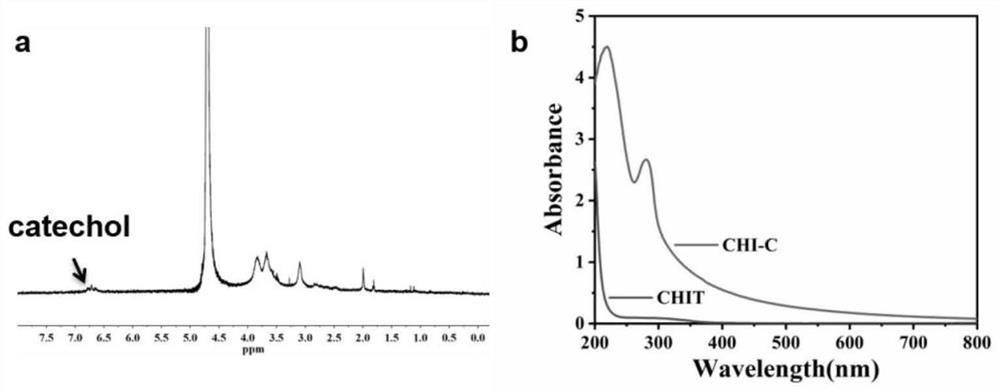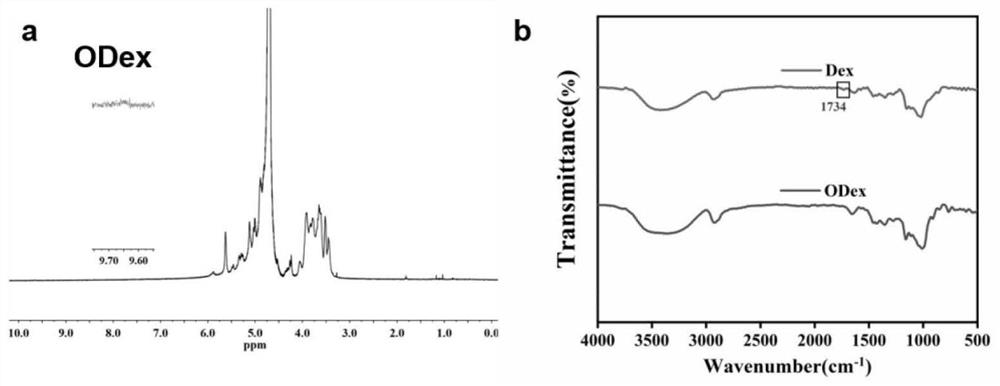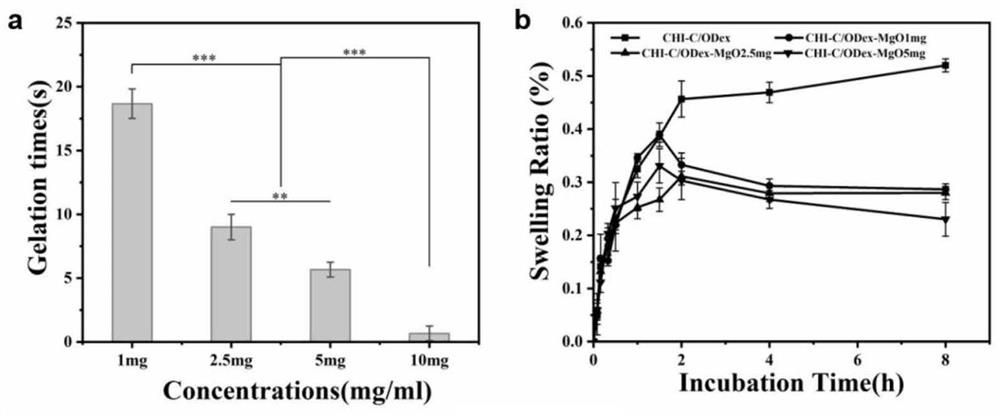A multifunctional natural polysaccharide repairing adhesive hydrogel, its preparation method and its application in the preparation of medicines for treating skin damage
A natural polysaccharide, multi-functional technology, applied in the field of material science, can solve the problems of sepsis and even osteomyelitis, and achieve the effect of shortening the gelation time, reducing the damage of the subcutaneous tissue, and reducing the viscosity
- Summary
- Abstract
- Description
- Claims
- Application Information
AI Technical Summary
Problems solved by technology
Method used
Image
Examples
Embodiment 1
[0029] Embodiment 1: the preparation of the chitosan of catechol modification
[0030] Add 3g chitosan and 300mL, 1mol / L HCl into a 500mL Erlenmeyer flask, stir thoroughly for 2 days, and after fully dissolved, adjust the pH of the solution to 4.5 with 1mol / L NaOH to obtain solution A. Dissolve 2.17g of dihydroxyphenylpropionic acid in 25mL of deionized water, and slowly drop it into solution A after being fully dissolved. During this process, continuous stirring is required to obtain solution B. Take 2.48 g of 1-(3-dimethylaminopropyl)-3-ethylcarbodiimide hydrochloride and dissolve it in 50 mL of water and ethanol solution (the volume ratio of water and ethanol is 1:1), and slowly Drop into solution B, adjust the pH of the solution to 5 with 1mol / L NaOH throughout the whole process, pour the reaction solution into a dialysis bag (cellulose, molecular weight cut-off 12000Da) after reacting for 8 hours, and dialyze with a hydrochloric acid solution of pH=4.5 at room temperature...
Embodiment 2
[0031] Example 2: Preparation of dextran modified by aldylation
[0032] Dissolve 4g of dextran in 320mL deionized water and stir to dissolve fully to obtain a dextran solution; dissolve 4.2g of sodium periodate in 80mL of deionized water to obtain a sodium periodate solution; add the sodium periodate solution to the glucose In the polysaccharide solution, the whole reaction was protected from light for 24 hours, and then poured into a dialysis bag (cellulose, with a molecular weight cut-off of 3500Da), dialyzed with deionized water at room temperature for 3 days, and replaced the deionized water 3 times a day. The dialysate was frozen in liquid nitrogen and then frozen. Dry and store at -80°C to obtain aldehyde-modified dextran.
Embodiment 3
[0033] Embodiment 3: the preparation of skin restoration adhesive
[0034] Get the catechol-modified chitosan 50mg that embodiment 1 obtains and be dissolved in 1mL PBS (phosphate buffered saline), obtain the catechol-modified chitosan solution; Get the formylation modification that embodiment 2 obtains 50 mg of dextran was dissolved in 1 mL of PBS (phosphate buffered saline) to obtain a dextran solution modified by aldylation; after the two were fully dissolved, 2.5 mg MgO was weighed and added to the dextran In the solution, after rapid mixing, use a 1mL syringe to draw respectively the chitosan solution modified by catechol and the dextran solution modified by aldylation, and then blend with a spiral needle to obtain the multifunctional natural polysaccharide of the present invention. The repair bonding hydrogel is then injected into damaged skin to repair the skin.
PUM
| Property | Measurement | Unit |
|---|---|---|
| viscosity | aaaaa | aaaaa |
| length | aaaaa | aaaaa |
| diameter | aaaaa | aaaaa |
Abstract
Description
Claims
Application Information
 Login to View More
Login to View More - R&D
- Intellectual Property
- Life Sciences
- Materials
- Tech Scout
- Unparalleled Data Quality
- Higher Quality Content
- 60% Fewer Hallucinations
Browse by: Latest US Patents, China's latest patents, Technical Efficacy Thesaurus, Application Domain, Technology Topic, Popular Technical Reports.
© 2025 PatSnap. All rights reserved.Legal|Privacy policy|Modern Slavery Act Transparency Statement|Sitemap|About US| Contact US: help@patsnap.com



